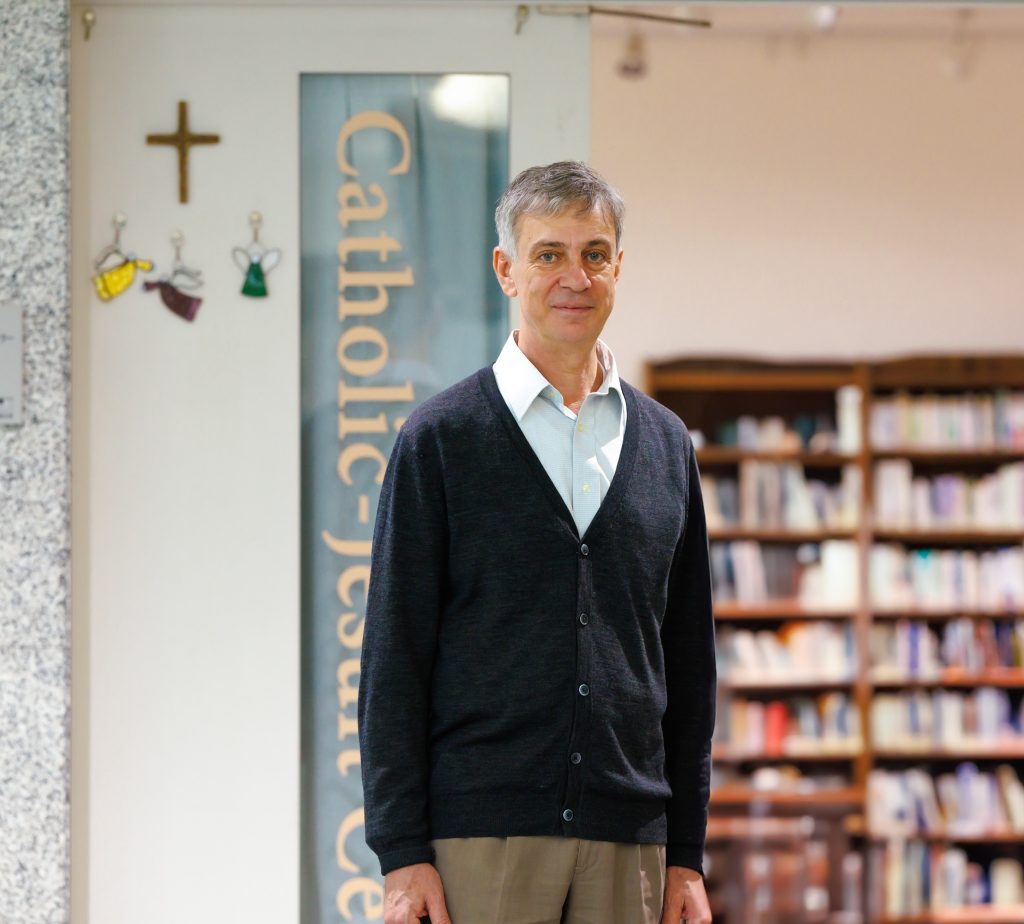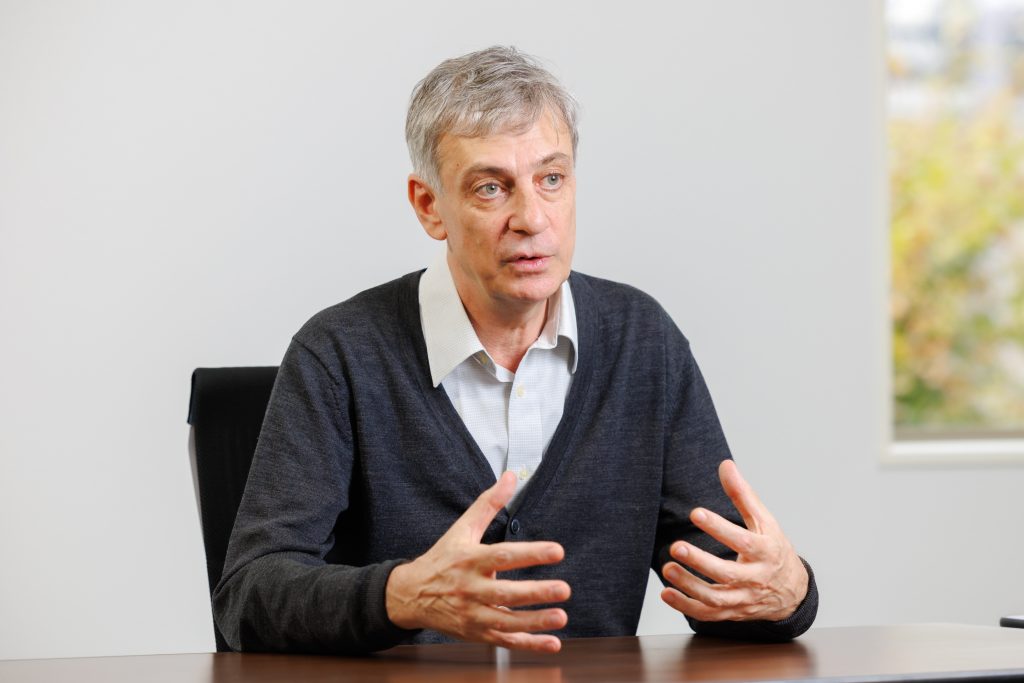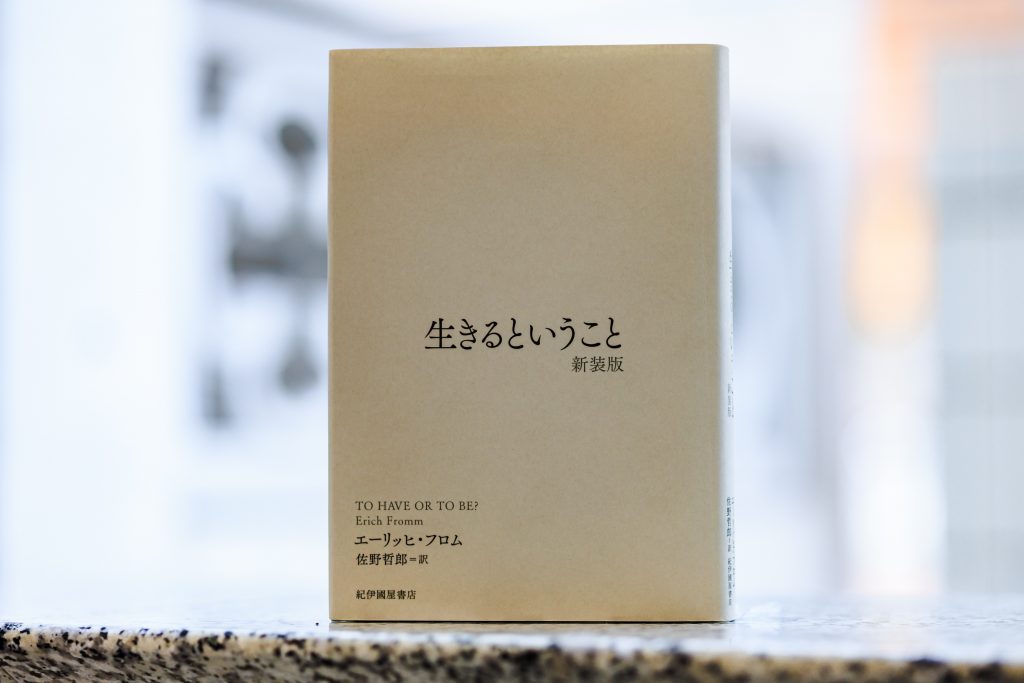
The research of philosopher and Catholic priest, Professor Juan Carlos Haidar of the Faculty of Theology, centers on philosophical humanism. Drawing from philosophical insights, Haidar discusses what it means to live authentically as a human being and what lies at the root of issues such as environmental destruction, war, and discrimination.
I specialize in philosophy. When someone asks me to define philosophy and its utility, I am reminded of the words of the ancient Greek philosopher Socrates: “The unexamined life is not worth living.”
This rings especially true for our current era, which is characterized by an overwhelming abundance of information and relentless pace of life. Everyone seems to be running, but where to? On the train, people are playing games and looking up information instantly using only their fingers. These are not acts of contemplation, or feeling, and I do not think we can characterize these moments as truly “living.” Living is characterized by unhurried contemplation and feeling.
Without philosophy, education and science are reduced to mere technology

I want young people to read good novels and listen to good music. I also hope they will build meaningful relationships with others. To savor great works of art, one needs the time, patience, and cultivation to immerse oneself in a different world. It is easy to lose yourself in cheap entertainment because it does not require you to step out of yourself. The same can be said of relationships. It is only through a deep relationship with others that people begin thinking about love and the act of sacrificing oneself for the sake of love.
The world we live in is beautiful; and life, in spite of everything, is wonderful. But to realize this we need to live – to live in the real sense of the word, to live with responsibility. Philosophy helps us to accomplish this. There was a philosopher of the middle age, Isidoro of Seville, who defined philosophy as the “reflection about things human and divine that follows the care of living righteously”. I like this definition. When we care for living righteously, as Isidoro says, we realize how amazing place the world is and how many things we need to reflect on. This reflection leads us back again to life, to a better and more meaningful life. This is what philosophy is all about.
Philosophy is important in all academic disciplines and sciences. Without philosophy, the consideration of morality, and the sacred quality of humanity, academic study becomes nothing more than technique and technology – which can be dangerous. Artificial intelligence, for example, is just a technology, and it alone will not improve the lives of people. I believe that environmental destruction – and, in a sense, the destruction of humanity – can also be traced to science that lacks philosophy.
What is at the root of war and discrimination?
The conflict between Palestine and Israel is just one of many global issues involving war and discrimination. According to the Bible, God creates the world and tells the first humans that they may eat the fruit of any tree in the Garden of Eden, except for the tree that is planted in the center of the Garden. Jewish philosopher Emmanuel Levinas, who deeply reflected on the concept of the “other,” explained that this central tree symbolizes the need, or better the obligation, of caring for others. We are not allowed to touch that tree. In other words, we must take care of people, no matter what. This principle is inviolable. However, people often dismiss it with excuses like “but they did this,” or financially driven rationalizations. This, perhaps, lies at the root of the problem.
I am from Argentina, but my grandparents were born in Palestine. Many Jews live in Argentina and I had many Jewish friends growing up. I later became a priest and was dispatched as a missionary to Japan, where I lived for a long time, but the major learning I had through all of this is that people are the same, regardless of where they are from.
When people point out the differences between us, they will usually emphasize differences in culture or ways of thinking, but we all share a deep-seated love and good within us. That is the foundation of humanity.
The book I recommend
“To Have or to Be?”
by Erich Fromm, Harper & Row

In this book, Fromm advocates for a way of “being” in which living itself is the goal, as opposed to living to “have” possessions, knowledge, health, social status, or power. I, too, want young people to cultivate their thoughts and feelings by reading good novels and music and by building meaningful relationships with others. I believe that is what it means to live as a human being.
-
Juan Carlos Haidar
- Professor
Department of Theology
Faculty of Theology
- Professor
-
Haidar was born in Argentina and graduated from the University of the Salvador. He attended Sophia’s Faculty of Theology where he obtained his Lic. in Theology, before obtaining his Doctor of Philosophy at Comillas Pontifical University. He assumed his current position after serving as Associate Professor at Sophia’s Faculty of Theology and as head of the Catholic Center.
- Department of Theology
Interviewed: October 2024